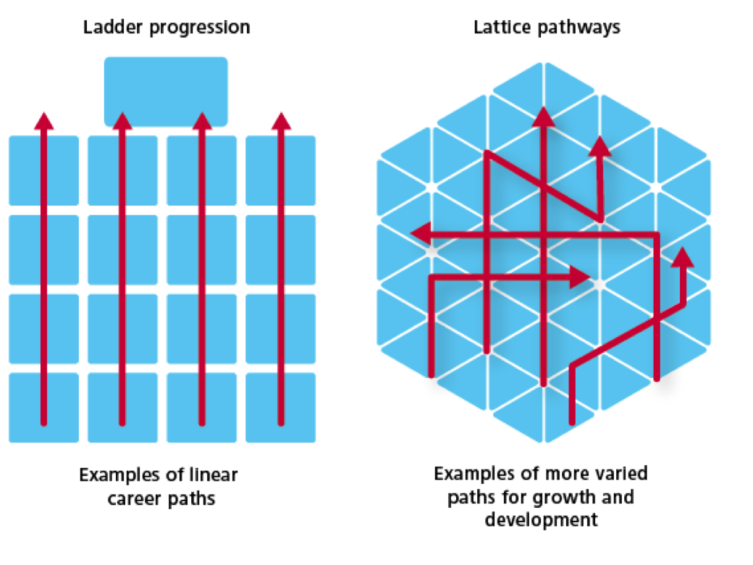Why the Career Ladder is Dead
In the words of George Jefferson from the television show, The Jeffersons, “Well we’re movin on up, to the east side. To a deluxe apartment in the sky. Movin on up, to the east side. We finally got a piece of the pie.” That’s a generational throwback for you from the mid-70s, and it’s a classic example of how times have changed across generations. Why does this capture how times have changed? Several reasons. The first is that we no longer have career and personal ladders that we climb. Corporate America has shifted away from the idea we move up the corporate ladder, in part because Baby Boomers have filled all the rungs above us for so long. The result of those Boomers hanging out on the ladder rungs above us longer than expected? A more modern career model called the corporate lattice. In the corporate lattice, people routinely step laterally, backwards and crossways to gain new skills that keep them marketable. There are some common reasons why people use the lattice. One being corporate structures where the pay scales don’t keep up with hiring rates. For example, lots of people will leave a job for six months, and return to find the hiring rate is $1-2 above where they would have been had they stayed at the original position. Companies are facing turnover because they haven’t done a good job of matching new candidate offers to what their current employees are making. Another reason people use this model is they know the company is not going to be loyal to them in the case of an economic downturn, so the person takes charge of her career and protects herself by making sure her skill set is vast and variable. By having a variety of skills, the employee can protect herself should there be a need to, and in these business times, it’s a realistic need. Beyond seeing the corporate model shift from ladder to lattice, we are also seeing a shift in values and priorities across the generations. The 80 million Boomers who entered the workforce in the 60s and 70s, entered with a competitive, driven work style. Boomers found that to be a shining star in their office or field, they needed to compete and move up the ladder. Millennials have been raised to know they are shining stars no matter what their field or career path. It’s an internal adjustment that has moved approval from the outside manifestation of our worth to an inward manifestation of self-worth. Now there’s plenty to debate just in this paragraph, however, we see evidence of this shift in the move away from things of status, like “deluxe apartment in the sky.” Millennials are more likely to value experience over possession. I can experience more if my job is flexible and I can travel to a coffee shop to work than if I am stuck in a corner office. The change is intriguing and I encourage you to watch and ask people about their career paths and plans this week. Regardless of where you fall generationally, it’s important we’re aware of how our generational perspective impacts what we promote in interviews and in how we help our employees manage their paths.
Graphic from Dupress.com
Keynote speaker, trainer, and consultant, Sarah Gibson, helps organizations leverage the power of communication, teamwork and diversity to improve engagement and transform teams. To buy her book or inquire about her speaking programs, please visit www.sarahjgibson.com.



